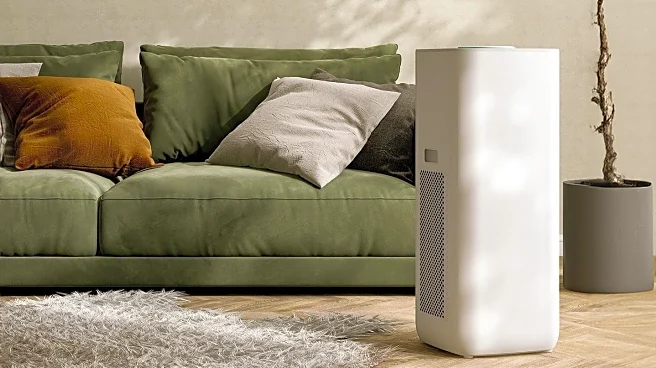What's Happening?
Experts have raised concerns about indoor air quality, emphasizing that it can be significantly more polluted than outdoor air. Michael Rubino, founder of HomeCleanse, and Dr. James Langer, CEO of Colorfil, have pointed out that indoor air pollution can lead to various health issues, including headaches, allergies, asthma, and even cancer. Common sources of indoor air pollution include cooking, HVAC systems, cleaning supplies, wet appliances, candles, incense, and air fresheners. These pollutants can introduce harmful particles into the air, affecting respiratory health. The experts suggest using air purifiers, maintaining HVAC systems, and opting for low-fragrance cleaning products to improve air quality.
Why It's Important?
The significance of this issue lies in the potential health risks associated with poor indoor air quality. As people spend a considerable amount of time indoors, especially in residential settings, the impact of these pollutants can be substantial. The health consequences can range from minor irritations to serious chronic conditions, affecting the quality of life and increasing healthcare costs. Addressing indoor air pollution is crucial for public health, as it can reduce the incidence of respiratory diseases and improve overall well-being. Homeowners and policymakers need to be aware of these risks and take proactive measures to ensure healthier indoor environments.
What's Next?
Homeowners are encouraged to take steps to improve indoor air quality by regularly servicing HVAC systems, using air purifiers, and choosing cleaning products with fewer volatile organic compounds. Additionally, awareness campaigns could be initiated to educate the public about the sources of indoor air pollution and effective mitigation strategies. Policymakers might consider regulations to limit the use of high-VOC products and promote healthier alternatives. The development of new technologies for air quality monitoring and purification could also play a role in addressing this issue.
Beyond the Headlines
The focus on indoor air quality highlights broader environmental and health concerns. It underscores the need for sustainable living practices and the importance of indoor environmental health. This issue also touches on the intersection of technology and health, as advancements in air quality monitoring and purification can lead to better health outcomes. Furthermore, it raises ethical considerations regarding consumer products and their impact on health, prompting discussions about corporate responsibility and consumer awareness.










